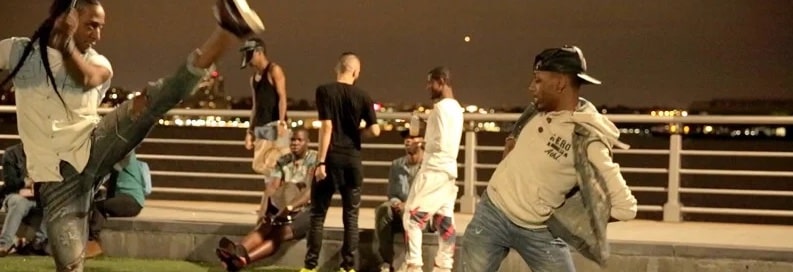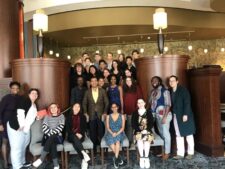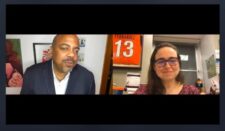The room on the third floor of the Tate Library is aglow with the light of a projector. Inside, ten or so Fieldston Upper Schoolers mill about, chatting and settling into seats. The pizza delivery enters the room smell-first, and the students jump up to fill their plates. Conversation flows easily: reviews of the live-action “Lion King,” thoughts on Freddie Mercury, and appreciation for the snacks.
Arhm Wild, Fieldston Middle School and Upper School Diversity Coordinator and Director of the Progressive Teaching Institute, moves to the front of the room. They welcome the students and teachers who are gathered on Transgender Day of Resilience (sometimes called Transgender Day of Remembrance) to watch the 2016 documentary “Kiki,” which focuses on LGBTQ+ ballroom culture in New York City.
“I wanted to do something to celebrate our community and allies,” Wild says, before hitting play.
“Kiki” is a look at how the ballroom scene comprised of mostly Black and Latinx dancers thrives today in much the same way as it did in the 80s and 90s — with chosen families (called “houses”); intricate fashion and artistic culture; events called “balls,” where participants walk, dance, and pose, competing for prizes; and community structures set in place when dancers’ broader communities (families of origin or the healthcare system in the US, for example) fail them.
While it’s essential to make visible the struggles that trans people face, it is also important to highlight the incredible resilience and creative force of this community.
The film opens with a close-up of a street sign that reads Sylvia Rivera Way — named for the gay liberation and transgender rights activist — and moves into introducing its subjects. “Kiki” highlights New York dwellers in their late teens and early 20s — a collection of LGBTQ+ people with a variety of gender identities and gender expressions. Viewers are invited to meet the different personalities, ranging from quiet and introspective to gregarious and expressive — and to follow their deeply varied experiences and narratives.
“Kiki” could be seen as an updated “Paris Is Burning,” the 1990 documentary that focused on New York City’s drag and voguing (an expressive dance derived from 80s ball culture) scenes. Both films highlight gender identity and expression, the trans community, and specifically Black and Latinx ball dancers. The film focuses on discrimination faced by the trans community, but also on hope and joy. “We picked “Kiki” because while it’s essential to make visible the struggles that trans people face, it is also important to highlight the incredible resilience and creative force of this community. We thought that this movie provided both,” Wild says.
The Diversity, Equity, and Inclusion Department has worked to create a safe and equitable space for trans and gender non-conforming students. The Department is “available to anyone who wants support in exploring their gender identity and/or expression, and also available to support allies who are looking to deepen their own understanding of how to support GNC and trans folks,” Wild says. The school also has several policies in place that support transgender and gender non-conforming students, they continue, like the Gender Support Plan, which serves as a guideline for supporting any ECFS student who wishes to update their gender identity in the student information directory and on campus in general, and the Overnight Accommodations Policy, which ensures that students’ sleeping arrangements will be in line with their gender identity on school trips.
Showing “Kiki” is part of the push for trans representation at ECFS — a critical component of creating a welcoming, inclusive space in line with the School’s core tenets. “It is important to highlight trans narratives on campus because their stories are often glossed over, reductive, or overlooked,” Wild says. “Transgender folks, especially trans people of color, face some of the highest rates of violence and homicide. Sharing their stories is an important part of interrupting the tides of bigotry and oppression.”
For the length of the movie, the students watch with rapt interest. When the end credits roll, Mila V. ’21 and Axis F. ’21 turn on the lights and begin to facilitate a conversation about the film.
The audience members introduce themselves with names, pronouns, and an observation about the movie. Fieldston Upper School Diversity Coordinator Russell Marsh notes that “Kiki” “centered the most vulnerable of the LGBTQ community and gave them humanity” — a welcome change from the traditional discourse about the LGBTQ community that often centers on white, cisgender men.
This opens up a dialogue about issues facing the queer community — which topics get dealt with, whose stories get told, and whom progress serves. For example, who led the charge for marriage equality? The group agrees that while marriage equality is certainly nice, it likely succeeded because the face of the cause was white, cis people — and that the idea that marriage equality translates to equity is patently false. The group discusses more pressing issues — matters of survival like housing discrimination, healthcare discrimination, and the endemic murder of black and brown trans women. Recognizing the overwhelming injustice, the students are fired up.
But the students are not helpless. They talk about effecting change first within their community at ECFS and then in the broader world, a process that entails recognizing privilege and power dynamics and utilizing their privilege wisely. On campus, students can advocate for institutional change, like the advocacy that brought gender-inclusive bathrooms to campus.
But using your own voice for change is meaningless if it drowns out the voices of the marginalized. So Axis offers a key takeaway for any changemaker: “Listen to our trans community.”




